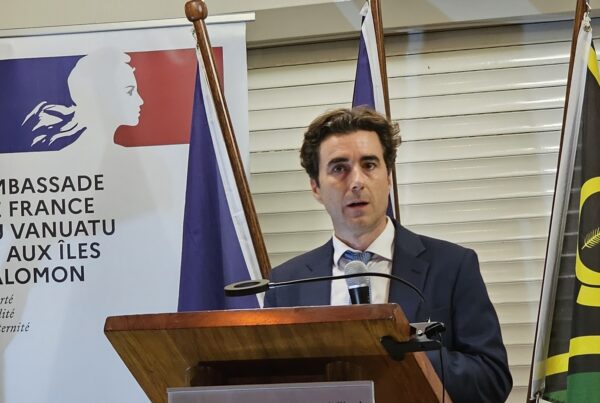Inclusion of Vanuatu on lists of non-cooperative and anti-money laundering jurisdictions: Explanatory elements
This note produced for information purposes by the French Embassy in Vanuatu and has no official status. The English translation is provided by the Financial Centre Association of Vanuatu and comes “as is” with no guarantee; it has not been authenticated nor approved by the French Embassy in Vanuatu.
The European Commission has included Vanuatu on two distinct lists:
- The AML/CTF (Anti Money Laundering and Counter Terrorist Financing) list of countries at high risk since September 2016
- The NCST (Non-cooperative States and Territories), separated into Annex I (blacklist) and Annex II (greylist), since March 2019.
This note aims to synthesize the characteristics and objectives of the lists, and the reasons for Vanuatu’s inclusion on them.
1/ The NCST list
1.1 General principle
The list is established by the ECOFIN Council (uniting all the Economy and Finance Ministers of its Member States) at the behest of the Code of Conduct Group (COCG)1. It targets harmful tax practises and the absence of transparency, mainly on the basis of four OECD criteria that define a tax haven:
- Non-existent or weak taxation;
- Absence of transparency in fiscal matters;
- Legislation that inhibits exchange of information;
- Tolerance of shell companies.
ECOFIN organizes the four criteria into two groups of specific criteria with which it decides to include a jurisdiction in Annex 1 (the blacklist).
Criteria 1 concerning Tax Transparency:
1.1 Application of AEI (Automatic Exchange of Information2) of the OECD;
1.2 Evaluation by the Global Forum3 at the level of “Compliant” or “LargelyCompliant”;
1.3 Ratification of the Convention on Mutual Administrative Assistance in Tax Matters4 of the OECD.
Criteria 2 concerning Fair Taxation:
2.1 Elimination of Harmful Tax Practices;
2.2 Absence of offshore structures that do not involve real economic activity within thejurisdiction;
2.3 Member of the OECD’s inclusive framework on BEPS (Tax Base Erosion and Profit Shifting5)
1.2 Inclusion of Vanuatu in Annex 1
Vanuatu is essentially listed in Annex I on the basis of non-respect of criteria 1.2 and 2.2. Having not met the EU’s initial requirements dealing with offshore structures on December 31, 2018, Vanuatu was first added to Annex I in March 2019 under criteria 2.2. Technical assistance was provided by the Commission in 2019 and work sessions were held in Suva and in Paris, without convincing result. A first draft of legislation was presented in 2020, and deemed insufficient.
Having received an evaluation of “Partially compliant” from the Global Forum in 20196, Vanuatu was listed in Annex I also under criteria 1.2. The Global Forum provided technical assistance in Port Vila to help lift the assessment. Exchanges may be in progress (The Global Forum does not comment on the status of discussions).
Exchanges continue with the EU. The Business Licence Act project was addressed by Port Vila in Brussels for an evaluation scheduled for Fall 2021.
2/ AML/CFT List
2.1 General principle
Since 2018, the European AML/CFT list has been distinct from the FATF list7.
After the attacks on the Bataclan theatre (November 13, 2015) and Nice (July 14, 2016), and the mobilization of France against the financing of terrorism, the EU decided, with its 5th Directive against money laundering in July 2018 (adopted into French law in February, 2020), to reinforce protection mechanisms by constituting its own list, distinct from that of the FATF. It strengthens the 4th Directive on the following points:
- Strengthening of transparency by the implementation of registries accessible to the public for companies, trusts and other legal entities;
- Strengthening the powers of EU financial intelligence units;
- Limitation of anonymity related to virtual currencies and wallet providers, but also to prepaidcards;
- Broaden evaluation criteria for high-risk third countries and improve guarantees for financialtransactions to and from these countries;
- Establishment of central registries of bank accounts or research systems in all Member States;
- Improvements to cooperation and exchange of information between supervisory agencies inthe fight against money laundering and between prudential supervisory authorities and the central European bank.
Third countries are evaluated using eight criteria8 (or Building Blocks):
- Criminalization of money laundering and terrorism financing;
- Measures relating to customer due diligence, to recording and reporting of suspicioustransactions by financial institutions;
- Measures relating to customer due diligence, to recording and to reporting of suspicioustransactions by designated non-financial businesses and professions;
- Powers and procedures of third country competent authorities in the fight against moneylaundering and terrorism financing;
- Existence of dissuasive, proportionate and effective sanctions;
- Third country practices regarding cooperation and exchange of information with competentauthorities in Member States;
- Availability, for competent authorities, of accurate and timely information on the beneficial ownership of legal persons and legal entities9;
- Implementation of targeted financial sanctions related to terrorism and its financing.
2.2 Inclusion of Vanuatu on the AML/CTF list
This distinction between the FATF and AML/CTF lists, the latter being the stricter, subsequent to the adoption of the 5th Directive and in line with the new methodology for the identification of high-risk third countries, explains how Vanuatu has been maintained on the second list after having been removed from the first in 2018.
In addition, while the NCST and AML/CTF lists are truly distinct, the European Commission prioritizes analysis of countries that have not respected their tax commitments when identifying high-risk countries in the fight against money laundering and terrorism financing.
Essentially, inclusion on the AML/CTF10 list is due to the gravity of the level of non-respect of criteria required by the NCST list, the degree of opacity maintained by competent authorities and, in particular, with regard to offshore structures as well as the means of identification of beneficial owners.
Vanuatu’s case is exacerbated by programs for the sale of passports in exchange for investment that have seen an exponential increase and represent a significant portion of the country’s public revenues. The current system, beginning with the possibility for beneficiaries to change their marital status, poses serious difficulties not only in terms of tax transparency, but also money laundering and terrorism financing.
With the EU, exchanges have continued after the political dialogue of April 21, 2021. The correspondent is the DG FISMA (Directorate-General for Financial Stability, Financial Services and Capital Markets Union) of the European Commission which is working with the country’s authorities to monitor measures taken to remedy identified strategic deficiencies.
3/ Comments
The European Union does not expect ad hoc responses (occasional transmission of information, etc.) but long-term legislative and criminal measures. It systematically offers technical assistance to listed countries.
Regarding Vanuatu, the measures taken by the EU are based on concrete evidence, they are not discriminatory and are not the expression of an isolated position. They reflect not only the FATF evaluation, but also the IMF’s most recent concerns and recommendations. Thus, in the conclusion of the consultations in 2021 with Vanuatu under Article IV, the IMF’s Board of Directors writes:
“Directors underscored the importance of improving governance, reducing corruption, and bolstering Vanuatu’s risk profile, to mitigate risks stemming from weak due diligence of the ECP and the loss of correspondent banking relationships (CBRs). Directors urged the authorities to further strengthen legal frameworks and the institutional capacity pertaining to AML/CFT, tax transparency, and central bank autonomy and governance.”
Only continuation of the dialogue will allow Vanuatu to be removed from the two lists as recognized by the government itself which, in its latest economic and financial update for the first half of 2021, published in August, admits of persistent shortcomings and recalls the country’s commitments to the OECD World Forum and the EU Code of Conduct Group:
“[…] the government is working hard to ensure that Vanuatu meets international standards in terms of taxation best practices. This includes standards set by the OECD Global Forum on transparency and exchange of information for tax purposes and the European Union’s Code of Conduct. Vanuatu risks serious harm to its reputation and suffering serious economic damage if it does not comply with these standards. Until 2017, Vanuatu made a lot of progress to obtain the rating of “largely compliant” with the OECD Global Forum by implementing the necessary laws. However, it failed to effectively enforce the legislation and was downgraded to a “partially compliant” rating in 2019. Vanuatu has made efforts to resolve its weaknesses and is undergoing further review to improve its rating. In 2019, the EU GCC concluded that Vanuatu had taken insufficient measures to meet its commitments. […] To solve the problem, the government is working on reforms that include a revival of the law on commercial patents. After consultations, it was concluded that the texts must be ratified by Parliament this year and actually implemented for Vanuatu to be removed from the blacklist.”
- The Council group responsible for monitoring the implementation the EU code of conduct in the area of business taxation. ↩︎
- For further explanation see: https://www.oecd.org/fr/ctp/echange-de-renseignements- fiscaux/echangeautomatique.htm ↩︎
- The Global Forum on transparency and exchange of information for tax purposes is the chief international organization working towards implementation of global standards for transparency and exchange of information. ↩︎
- For further explanation see: https://www.oecd.org/fr/ctp/echange-de-renseignements-fiscaux/convention-
concernant-l-assistance-administrative-mutuelle-en-matiere-fiscale.htm ↩︎ - For further explanation see: https://www.oecd.org/fr/ctp/beps/ ↩︎
- See the Global Forum peer review of Vanuatu: https://read.oecd-ilibrary.org/taxation/global-forum-on-
transparency-and-exchange-of-information-for-tax-purposes-vanuatu-2019-second- round_dd70b774- en#page1 ↩︎ - The Financial Action Task Force (FATF) is an intergovernmental organization created in 1989 by the Ministers of its Member States. The FATF’s objectives are the development of standards and promotion of legislative, regulatory and operational measures in the fight against money laundering, terrorism financing and other related threats to the integrity of the global financial system. ↩︎
- See the complete methodology here: https://ec.europa.eu/info/sites/default/files/swd_2018_362_f1_staff_working_paper_en_v2_p1_984066.pdf ↩︎
- On this point in particular, the Union’s requirements may extend beyond those of the FATF notably when the evaluation or action plan adopted with regard to the third country is not sufficiently ambitious. ↩︎
- See details of the procedures at https://ec.europa.eu/info/business-economy-euro/banking-and- finance/financial-supervision-and-risk-management/anti-money-laundering-and-countering-financing- terrorism/eu-policy-high-risk-third-countries_fr ↩︎





